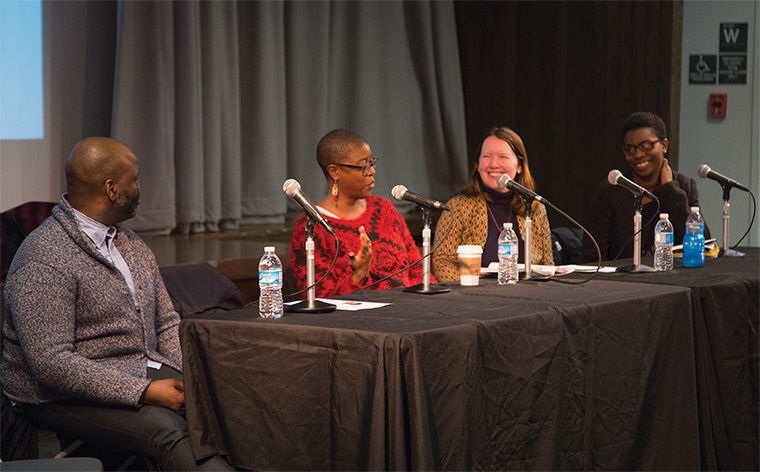Panelists discuss going ‘all in’ within artistic community
Local artists visited the college Feb. 17 to discuss how to foster a creative community across the city through collaboration at a panel discussion titled “All In: Making Art and Community in Chicago.” The panel was hosted at Stage Two in the 618 S. Michigan Ave. Building.
February 23, 2015
Local artists from a wide range of disciplines and members of the campus community gathered to discuss the importance of creating art and fostering an artistic community in Chicago.
A panel titled “All In: Making Art and Community in Chicago” discussed these issues Feb. 17 at Stage Two in the 618 S. Michigan Ave. Building. The event occurred in conjunction with the current “Engage/Connect” exhibit, a show of student work running through March 6.
Felicia Holman, curator of “Engage/Connect,” served as the moderator for the panel discussion and has attended similar talks at the college in the past. She said they inspired what she had in mind when she coordinated the show.
“It felt right for me as a part of my guest curatorial commission to have programming and events supporting the exhibition,” Holman said.
The panel, handpicked by Holman, included Chicago artists and art administrators Baraka de Soleil, Krista Franklin, Marie Casimir and Carron Little. She said their work has been recognized internationally and their knowledge about community engagement is invaluable.
Mark Porter, exhibition coordinator in the Department of Exhibition & Performance Spaces, said the panel mirrored Holman’s idea of engaging and connecting talent. Porter said hearing artists outside of the college talk about how they interact with the community is beneficial for students because they have an external perspective.
The discussion emphasized creating community and noted the importance of learning to build relationships with local artists of similar and different disciplines.
“I don’t know how to make art other than [through collaboration],” said Franklin, an interdisciplinary artist and 2013 MFA alumna of the Center for Book and Paper Arts. “It’s hard to even think about art practice or creative work being [done or created without collaborating with other artists].”
The audience and community coordinator for the Dance Center, de Soleil said artists may be talented, but a lack of involvement with their colleagues hinders their chances of a successful career.
“The moment an artist disconnects from a community or doesn’t know how to collaborate, that does not lead to sustainment,” de Soleil said.
Little, co-founder of the Out of Site performance festival, spoke mostly about the changes she wants to see within the larger community setting for artists and their rights to earn a living.
“There is a problem here with [seeing] the artist as a ‘starving artist.’” Little said. “I personally really resent that term because we have a right to having a living wage like every other profession.”
Little said she wants to see her creative colleagues work with politicians to ensure that improvements to cultural policies are being made so artists can find work in the city.
“This hierarchy has been created where institutions feel a lot more comfortable giving money to a designer or a consulting firm,” Little said. “That is to the loss of the artist and the creative community. We have to go out there and rewrite the policies so we begin to invest in artists and our cities. When we do that, we create a major difference.”
Viktor Givens, a first-year MFA student in the Center for Book and Paper Arts and a student artist featured in “Engage/Connect,” said he came to the panel to interact with other artists interested in the collaborative process.
Givens said he is now learning the importance of collaborating in his own work, which he believes is vital for art to reach its full potential.
“It has its positive challenges,” Givens said. “You have to [learn to collaborate] in order for the work to bloom beyond conception.”
Givens said he does not believe Columbia properly provides enough opportunities to collaborate across majors, and de Soleil said he hopes to see working between disciplines becomes more of a focus in arts education.
“The notion of collaboration—if it was [made essential] in education and in practice, that would shift the complete dynamic of hierarchy, the complete dynamic of how people think about power,” de Soleil said.








